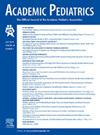强制性医疗补助 HMO 对儿童医疗服务的获取、使用和健康结果的影响。
IF 3
3区 医学
Q1 PEDIATRICS
引用次数: 0
摘要
目的:强制加入医疗补助签约健康维护组织(HMO)是医疗补助管理性医疗(MMC)最常见的形式,但这种加入对儿童的影响尚不清楚。我们利用各州内部和各州之间在 MMC 实施方面随时间推移而产生的差异,来研究强制性医疗补助 HMO 注册对儿童就医、使用和健康结果的影响:利用 2000 年至 2018 年的医疗支出小组调查数据和多变量回归模型,我们估算了生活在仅有强制性医疗补助 HMO 注册的县与其他 MMC 类型和 FFS 合并为一个比较组相比,对 18 岁以下儿童的影响。我们还评估了不同年龄、种族/民族以及有特殊医疗保健需求的儿童(CSHCNs)的潜在效应异质性:结果:强制性 HMO 注册与大多数结果指标之间的关联较小且不显著。然而,与其他 MMC 和 FFS 在一组中的组合相比,强制 HMO 注册与拥有惯常护理来源的可能性下降 1.8 个百分点(95% CI[-0.035,-0.001])、延迟获得护理的可能性增加 4.2 个百分点(95% CI[0.012,0.072])和拥有任何门诊医生就诊的可能性降低 2.2 个百分点(95% CI[-0.043,-0.0004])有关。强制加入 HMO 与 CSHCN 看专科医生更难有关:总体而言,几乎没有证据表明强制性医疗补助计划 HMO 的加入会对广泛的结果产生明显且一致的影响。评估强制性医疗补助 HMO 如何影响更细微的医疗保健措施,尤其是对医疗保健需求更大的儿童的影响,仍是未来研究的重要问题。本文章由计算机程序翻译,如有差异,请以英文原文为准。
The Effect of Mandatory Medicaid Health Maintenance Organizations on Health Access, Utilization, and Health Outcomes for Children
Objective
Mandatory enrollment into Medicaid-contracted health maintenance organizations (HMOs) is the most common form of Medicaid managed care (MMC), but the effects of this enrollment on children are unclear. We leveraged variation in MMC implementation within and across states over time to examine the effect of mandatory Medicaid HMO enrollment on children’s access, utilization, and health outcomes.
Methods
Using Medical Expenditure Panel Survey data from 2000 to 2018 and multivariable regression models, we estimated the effects of living in a county with mandatory Medicaid HMO enrollment only, compared to other MMC types and fee-for-service (FFS) combined in 1 comparison group, on outcomes for children under 18 years. We also evaluated potential effect heterogeneity across age, race and ethnicity, and for children with special health care needs (CSHCNs).
Results
There were small and nonsignificant associations between mandatory HMO enrollment and most outcome measures. However, mandatory HMO enrollment was associated with a 1.8%-point decline in the likelihood of having a usual source of care, 95% confidence interval (CI) [−0.035, −0.001], a 4.2%-point increase in the likelihood of delayed access to care, 95% CI [0.012, 0.072], and a 2.2%-point reduction in the likelihood of having any outpatient physician visits, 95% CI [−0.043, −0.0004], compared to other MMC and FFS combined in 1 group. Mandatory HMO enrollment was associated with more difficulty seeing a specialist for CSHCNs.
Conclusions
Overall, there is little evidence that mandatory Medicaid HMO enrollment has discernable and consistent effects across a broad range of outcomes. Evaluating how mandatory Medicaid HMOs affect more nuanced health care measures, especially for children with greater health care needs, remains an important future research question.
求助全文
通过发布文献求助,成功后即可免费获取论文全文。
去求助
来源期刊

Academic Pediatrics
PEDIATRICS-
CiteScore
4.60
自引率
12.90%
发文量
300
审稿时长
60 days
期刊介绍:
Academic Pediatrics, the official journal of the Academic Pediatric Association, is a peer-reviewed publication whose purpose is to strengthen the research and educational base of academic general pediatrics. The journal provides leadership in pediatric education, research, patient care and advocacy. Content areas include pediatric education, emergency medicine, injury, abuse, behavioral pediatrics, holistic medicine, child health services and health policy,and the environment. The journal provides an active forum for the presentation of pediatric educational research in diverse settings, involving medical students, residents, fellows, and practicing professionals. The journal also emphasizes important research relating to the quality of child health care, health care policy, and the organization of child health services. It also includes systematic reviews of primary care interventions and important methodologic papers to aid research in child health and education.
 求助内容:
求助内容: 应助结果提醒方式:
应助结果提醒方式:


